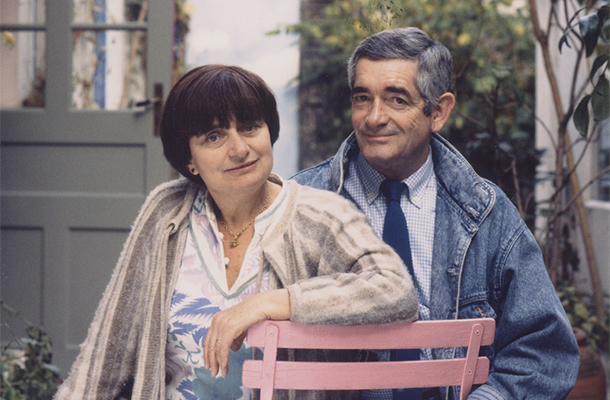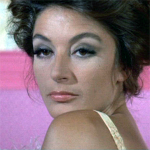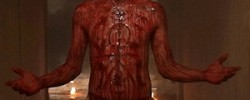
TIFF’s Bitter/Sweet The Joyous Cinema of Jacques Demy Review: The World of Jacques Demy (1995)
Cast: Anouk Aimée, Richard Berry, Nino Castelnuovo
Director: Agnès Varda
Country: France | Belgium | Spain
Genre: Documentary
Editor’s Notes: The following review is part of our coverage for TIFF’s Bitter/Sweet The Joyous Cinema of Jacques Demy which runs from June 27th to July 20th at TIFF Bell Lightbox. For more information of this unprecedented film series visit http://tiff.net and follow TIFF on Twitter at @TIFF_NET.
Like a love letter to a dead soulmate, The World of Jacques Demy reminds us of the thoughtful joyous anguish of Jacques Demy’s intriguing oeuvre and the unique voice that left an indelible mark on cinema as Agnes Varda (Demy’s wife of nearly thirty years) uses their shared artform to tell the story of her beloved husband and cinematic icon. The film admires Demy’s work less as a wife pining over the loss of a dead husband, but as one cinematic master paying homage to another on an equal playing ground, showing the disparity between the works of the two spouses and the mastery that each posited over their shared versatile artform. Varda explores Demy’s body of work with admiration rather than heartache, leaving young fans at his gravesite to do the only onscreen eulogizing, Varda using her own mastery of the art to say goodbye to her peer and partner in the best way she knew how.
The film admires Demy’s work less as a wife pining over the loss of a dead husband, but as one cinematic master paying homage to another on an equal playing ground, showing the disparity between the works of the two spouses and the mastery that each posited over their shared versatile artform.
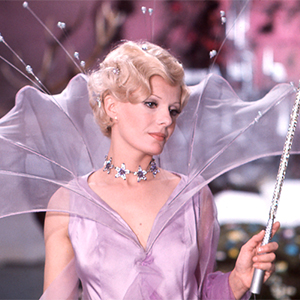 Demy was the kind of cinematic auteur that had the ability to shape our dreams like no other filmmaker; his colors flashing in our minds in their underplayed art-deco pastels, the infectious hooks of his songs providing the soundtrack to a more beautiful version of the world, and the heartache and emotions haunting us as we try to avoid the “bitter lucidity” of his missed connections and sobering glances at life’s inevitable misfortunes. His idiosyncratic visions weren’t immediately accepted, even by “forward thinking” French production companies, so he learned to play the game in order to get close to the artform that had infatuated him since childhood. His earliest attempts at creating light and motion on celluloid involved experimenting with worn out Chaplin reels, immersing them in warm water to wash away the images so that crude animated images could be hand drawn onto the frames. His first “proper” films were restrained in order to work within the budgetary realities of filmmaking, but still unique and capable of exhibiting glimpses into his extraordinary mind. In early films like Ars he didn’t fully understand what he wanted to express with the material, but he still manages to do so with a unique voice and subconscious subversion. In other early films he played with the versatility of the medium, combining the sobering images of Robert Bresson with the surreal gallantry of Jean Cocteau to create black and white explorations in form and technique.
Demy was the kind of cinematic auteur that had the ability to shape our dreams like no other filmmaker; his colors flashing in our minds in their underplayed art-deco pastels, the infectious hooks of his songs providing the soundtrack to a more beautiful version of the world, and the heartache and emotions haunting us as we try to avoid the “bitter lucidity” of his missed connections and sobering glances at life’s inevitable misfortunes. His idiosyncratic visions weren’t immediately accepted, even by “forward thinking” French production companies, so he learned to play the game in order to get close to the artform that had infatuated him since childhood. His earliest attempts at creating light and motion on celluloid involved experimenting with worn out Chaplin reels, immersing them in warm water to wash away the images so that crude animated images could be hand drawn onto the frames. His first “proper” films were restrained in order to work within the budgetary realities of filmmaking, but still unique and capable of exhibiting glimpses into his extraordinary mind. In early films like Ars he didn’t fully understand what he wanted to express with the material, but he still manages to do so with a unique voice and subconscious subversion. In other early films he played with the versatility of the medium, combining the sobering images of Robert Bresson with the surreal gallantry of Jean Cocteau to create black and white explorations in form and technique.
American musicals and Stanley Donen would offer him inspiration, but Demy painted his frames in unassuming pastels and used his soft brush to explore issues such as worker’s struggles, civil rights, and feminism…
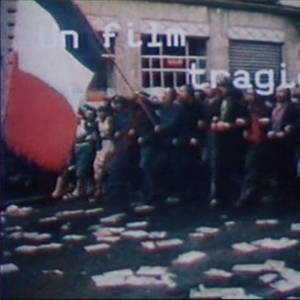 When Demy was allowed to fully explore the cinematic possibilities of his bold idea of contemporary opera, he created a cinema that was forged by the ineludible hammer of Nazism, creating a whimsical cynicism in a world that was ready to dream again, but not ready to forget. American musicals and Stanley Donen would offer him inspiration, but Demy painted his frames in unassuming pastels and used his soft brush to explore issues such as worker’s struggles, civil rights, and feminism; all colliding to create a cinema that is truthful and topical, dreamlike but with a hard edge as it snuck into minds with its soft delivery and exploding with the violent preoccupations of the contemporary French mind. This language of “popular opera” was gentle, violent, lyrical, and something uniquely Jacques Demy. The sheer audacity of Umbrellas of Cherbourg brought Demy to the world stage and we were all able to weep, laugh, and experience the unrequited romance of Genevieve Emery and Guy Foucher and watch tears fall into the snow as they did in our despondent dreams of Technicolor heartache.
When Demy was allowed to fully explore the cinematic possibilities of his bold idea of contemporary opera, he created a cinema that was forged by the ineludible hammer of Nazism, creating a whimsical cynicism in a world that was ready to dream again, but not ready to forget. American musicals and Stanley Donen would offer him inspiration, but Demy painted his frames in unassuming pastels and used his soft brush to explore issues such as worker’s struggles, civil rights, and feminism; all colliding to create a cinema that is truthful and topical, dreamlike but with a hard edge as it snuck into minds with its soft delivery and exploding with the violent preoccupations of the contemporary French mind. This language of “popular opera” was gentle, violent, lyrical, and something uniquely Jacques Demy. The sheer audacity of Umbrellas of Cherbourg brought Demy to the world stage and we were all able to weep, laugh, and experience the unrequited romance of Genevieve Emery and Guy Foucher and watch tears fall into the snow as they did in our despondent dreams of Technicolor heartache.
Demy’s mark on cinema is undeniable, but The World of Jacques Demy illustrates that mark in the perfect clarity that only a cinematic master, peer, and wife of Jacques Demy, Agnes Varda, could provide. Varda shows us Demy’s influence on cinema with the breathlessness of the young girls Rochefort while showing his influence on the hearts of the world as streets and are named after him and flower statues of gentle clod makers are grown in his honor. The film shows a master of color, shadow, movement, sound, and the clash of differing emotional elements to entice the viewer like the Pied Piper into his heartbreaking fairy tales as Varda herself recalls his films as cherished personal memories, but sometimes giving glimpses into the Fellini’esque circus that surrounded his massive productions, complete with helicopters, costumed jesters, ornamented elements, and Jim Morrison…
Related Posts
![]()
Matthew Blevins
![]()
Latest posts by Matthew Blevins (see all)

